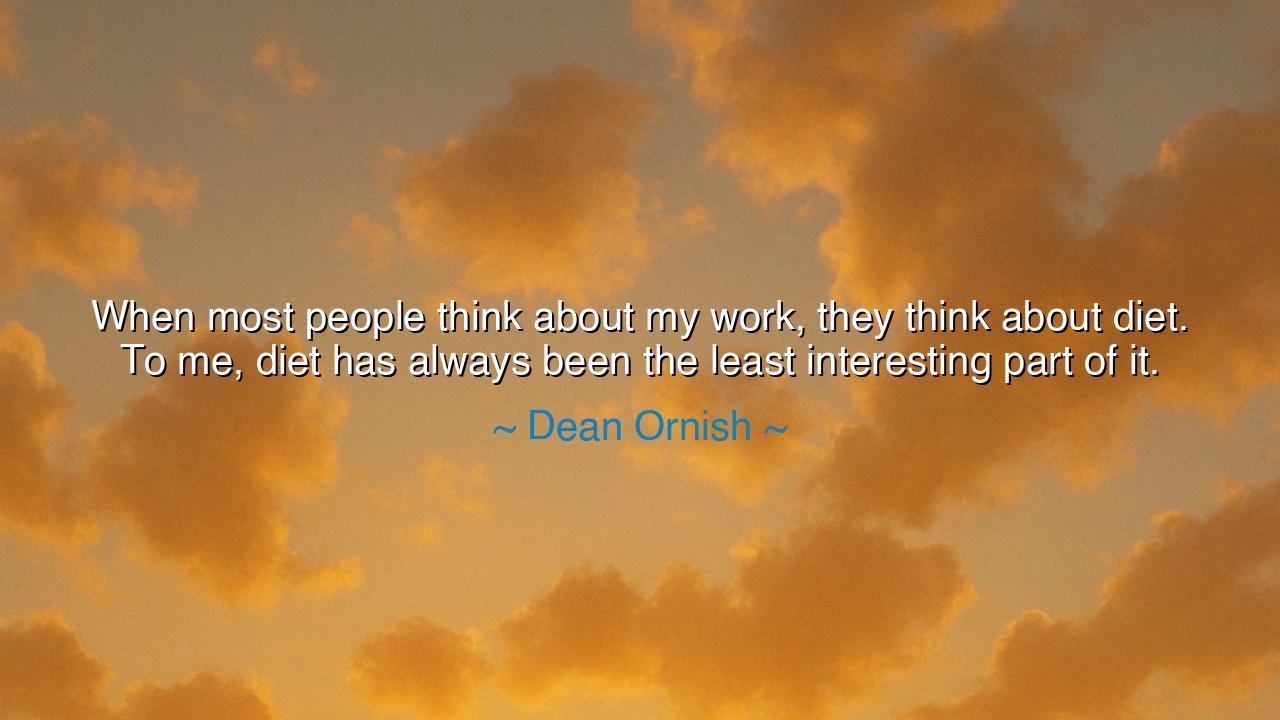
When most people think about my work, they think about diet. To
When most people think about my work, they think about diet. To me, diet has always been the least interesting part of it.






In the pursuit of health and well-being, there are those who focus on the surface—the diet, the meals, the restrictions and indulgences. But as Dean Ornish wisely states, "When most people think about my work, they think about diet. To me, diet has always been the least interesting part of it." Here, Ornish invites us to look beyond the superficial and into the heart of true wellness—a truth that has been taught by the great philosophers and healers of the ages: the body, the mind, and the spirit are not separate, but intricately interconnected. Diet, though important, is merely one aspect of the greater whole. The path to health is a comprehensive journey that includes nourishing the body, strengthening the mind, and nurturing the soul.
The ancient Greeks understood this profound truth. Hippocrates, the father of modern medicine, proclaimed, "Let food be thy medicine and medicine be thy food," but he did not stop there. To Hippocrates, health was not simply the absence of disease, but a balance of mind, body, and spirit. Diet was a crucial part of this, yes, but it was only one element of a much broader philosophy of living. The Greeks believed that the key to vitality lay in how we live—in our habits, our thoughts, our actions—and how all these elements worked in harmony. In this way, Ornish’s perspective echoes that of Hippocrates: the focus on diet alone is narrow, for true well-being encompasses far more.
Consider the teachings of Aristotle, who emphasized that to live a virtuous life is to cultivate balance in all things—moderation, wisdom, and consistency. He taught that strength and happiness arose not from extreme measures, but from finding the balance that allows the body, mind, and spirit to thrive together. To Aristotle, health was the natural result of a life lived in alignment with reason and moderation—which included diet, but also exercise, mental discipline, and ethical living. In the same way, Ornish teaches that the focus on diet is only one piece of the puzzle. True well-being comes from the cultivation of a holistic lifestyle, one that integrates physical health, mental resilience, and a life of meaning and connection.
The Romans, too, understood that the strength of the body was not merely a matter of what one consumed, but of a life lived in accordance with nature and reason. Cicero, the great statesman and philosopher, spoke often of the importance of self-discipline in all things, including diet. However, he also emphasized that to live a life of virtue required more than just external discipline; it required cultivating inner strength and a harmonious relationship with all aspects of life. The Romans believed in a holistic approach to life—one that included the nourishment of the body, but also the discipline of the mind, the care of one’s relationships, and the pursuit of purpose. Like Ornish, they understood that diet was important, but that it was merely a foundation upon which other aspects of health must be built.
Look to the example of the great warrior-heroes of ancient times, such as the Samurai of Japan. The Samurai were known for their discipline, not just in battle but in their entire way of life. Their diet, though simple and focused on the nourishment of the body, was only one part of their holistic approach to well-being. They trained the body with martial arts, sharpened the mind through meditation, and cultivated the spirit through rigorous ethical codes. The Samurai did not view diet as the end-all, be-all of health, but as a piece of a much larger tapestry. Their true strength lay in the integration of mind, body, and soul—an approach that mirrors Ornish’s holistic philosophy.
In the Buddhist tradition, the idea of a mindful life is central to the path of enlightenment. The Buddha taught that true health is a balance of the body, the mind, and the spirit—each aspect influencing the other. While the Buddha encouraged mindful eating and moderation, his teachings were never focused on diet alone. Instead, they urged a life of awareness in every action—whether it be the way we eat, the way we think, or the way we live our daily lives. Ornish’s emphasis on lifestyle over diet resonates with the Buddhist approach: to achieve lasting health, we must address the whole of our being, not just one aspect of it.
Thus, Dean Ornish calls us to reflect on a deeper truth: diet is only one element of the vast and intricate system that is our health. To focus solely on what we eat, to see diet as the end goal, is to miss the broader picture. Just as the ancients understood that the body must be cared for in a holistic manner, Ornish urges us to adopt a lifestyle that integrates nutrition, fitness, mental resilience, and a life of purpose. Diet is important, yes, but it is the foundation upon which a life of balance, vitality, and lasting well-being is built.
The lesson here is clear. In our own lives, we must seek balance in all things—diet, exercise, mental health, and purpose. Let diet be a tool, not a restriction, a part of a larger lifestyle that fosters well-being in all aspects. Embrace moderation, discipline, and mindfulness in all that you do. Like the ancients, cultivate a life where health is seen as an integrated, harmonious whole—where diet is not a burden but a natural expression of the balance between body, mind, and spirit. Only through this holistic approach can we truly unlock the full potential of a life lived in vitality and well-being.






AAdministratorAdministrator
Welcome, honored guests. Please leave a comment, we will respond soon